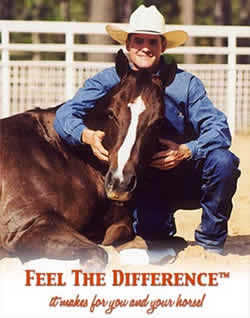 |
Horse
Training Simplified
"Horse
training is very simple - it's very black and white,"
says downunder's guru of horsemanship Clinton Anderson. What
a relief to know shades of grey don't always cloud the horizon!
|
See Anderson's horse training methods firsthand when he comes to Can-Am's
All Breed's Equine Emporium at London's Western Fair Raceway, in March,
2003.
Born and raised in Australia, Anderson now operates Wahl Equestrian
Center in Sterling, Illinois with his wife Beth. He conducts clinics
there, and films numerous technique videos as well as a weekly hour-long
television show. Untrained horses are used in the show, broadcast
on Dish Network and Direct TV, to solve common behaviour problems
and training issues faced by horse owners of all disciplines.
While growing up in Australia, Anderson's family noticed his natural
ability with horses and fuelled that interest with his first horse
at age 9. Anderson started a full time training apprenticeship at
age 15 with acclaimed clinician and horse trainer, Gordon McKinlay
of Rock Hampton, Queensland. During the next two years, Anderson started
and trained over 600 horses under McKinlay's expert guidance. Anderson
also trained with Australia's Ian Francis and U.S.'s Al Dunning, eventually
using his knowledge and expertise to start his own training facility.
With only 1 point separating the top three winning horses, Anderson
placed third at the Australian National Reining Futurity in 1997.
In October of that year, Anderson moved permanently to the U.S. where
he began touring, training and conducting clinics.
The philosophy behind Anderson's training methods is basic. "Horse
training is like a scale," he explains. "Where do we want
to be with our horse training? We want to be in the middle - somewhere
between being a wimp and getting dragged all over the place, and being
too rough and aggressive with our horse, always forcing him to do
things for us."
Getting a horse to accept responsibilty for his actions right off
the get-go is crucial. "If you rob a bank and you get caught,
you are going to jail - plain and simple."
He talks about the importance of love and respect between human and
horse. "A lot of people try to reward and love their horse to
get it to respect them. You can't love your horse to get it to respect
you. You can love it and reward for respecting you. There is a big
difference."
Anderson has observed how horses naturally relate to one another and
feels people should deal with their horses in similar fashion. "It's
very important that people understand that horses will deal with each
other in nature very peacefully," he says. "They rub and
groom each other and live in harmony. When there is disrespectfulness
in the herd's behaviour, the dominant mare will do whatever it takes
to make her point and restore harmony."
This
demonstrates how horses learn, which has everything to do with action
and nothing to do with words - English, French, Pig Latin, etc.
"You can't whisper sweet nothings in your horse's ear and expect
him to listen to you. Horses understand actions. They don't understand
words."
So, you, the horse trainer, horse owner, can take Anderson's words
from the show, translate them into action and strengthen your relationship
with your horse. "There is a loving, rewarding side,"
says Anderson, "and there is a pressuring, reprimanding side.
It is very important that you understand both sides, because your
horse will want to choose the rewarding side - if you set it up
for him to do so."
See Clinton Anderson, as well as other key speakers and celebrities
from across North America, at Can-Am's All Breeds Equine Trade Show,
which takes place March 13 through 16, 2003 at London's Western
Fair Raceway. Proceeds from this event will aid the Equine Reseach
Centre, Guelph, Ontario.
Ten thousand are estimated to attend this first annual London show,
which kicks off equine events for 2003.
Floor space is filling fast. Contact Paul Maguire at (519) 421-1189
or e-mail canamequine@bellnet.ca
or visit web-site www.can-amequine.com
if you have equine goods or services to promote.
.
|







